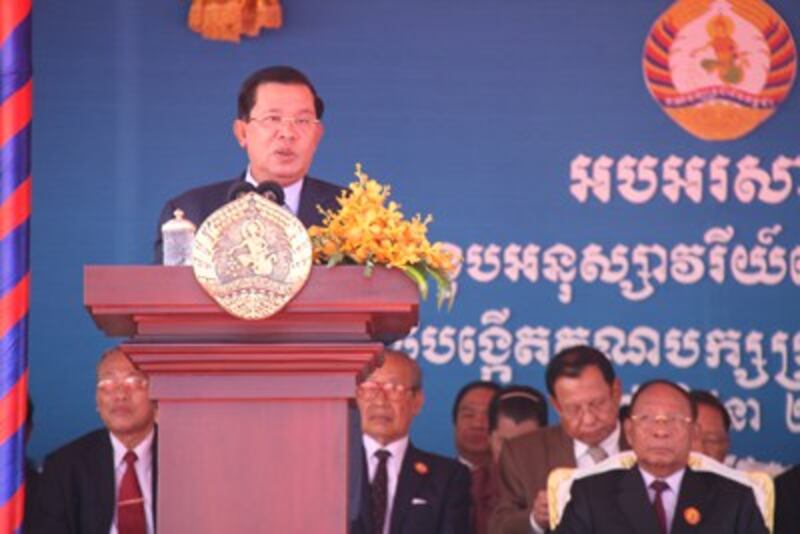Prime Minister Hun Sen has repeated that he will stand by the draft law on nongovernmental organizations currently under review by parliament, despite continued opposition by some groups which say the legislation would hinder their work in Cambodia.
Speaking at a celebration of the 64th anniversary of the ruling Cambodian People’s Party (CPP) in Phnom Penh on Sunday, Hun Sen said there was no doubt that parliament would pass the draft Law on Associations and Non-Governmental Organizations (LANGO), even as NGOs held a campaign in some provinces and municipalities to protest against the proposed legislation.
Both international and domestic NGOs and rights groups oppose the draft law because they say it would jeopardize their rights and restrict their activities in the impoverished country.
A group of United Nations officials also have criticized the proposed law, prompting the government to warn them not to interfere in Cambodia’s internal affairs.
But during his first public appearance as the newly elected CPP party president, Hun Sen said the law would ensure the rights of NGOs and unions according to the rule of law, and warned foreign countries not to interfere in his government’s decisions.
“The CPP strongly opposes foreign interference in the process to approve the draft law,” he told a crowd of more than 10,000 party members and diplomats. “This is a violation of Cambodia’s sovereignty and integrity. I urge respect for Cambodia’s decisions as an independent state and a UN member.”
Domestic rights group Licadho and other community organizations released balloons across the country on Monday urging lawmakers to reject the NGO draft law.

‘Dragging the country towards communism’
Social commentator Kem Ley said that in proposing the draft law, the CPP was dragging the country toward communism and warned that the party’s popularity would decline if it becomes law.
“The government is using the law to control the people for political benefits,” he said, adding that this was part of Hun Sen’s overall strategy is to win the next general elections in 2018 and secure himself a fifth term as prime minister.
Sam Rainsy, president of the opposition Cambodia National Rescue Party (CNRP), told RFA’s Khmer Service that Hun Sen told him that NGOs should not be concerned about the legislation because the draft law doesn’t require them to re-register with the government.
Nevertheless, Lut Lary, a Licadho coordinator in Kampong Chhnang province, said he is not happy with the draft law because it has not been widely debated.
“The government didn’t allow NGOs to contribute recommendations toward the draft law,” he said.
Later on Monday, however, National Assembly (parliament) spokesman Chheang Vun said the government would hold a national discussion on the draft law with all stakeholders, including NGOs, on July 10.
Tep Vanny, a land-rights activist from the Boeung Kak community in Phnom Penh, whose group has fought authorities for years over the evictions of thousands of families to make way for a development project that has yet to materialize, said the draft law would affect her small organization if it is approved because the government would likely shut it down.
“The law will kill us, will kill those who love justice and freedom,” she said.
The government approved the draft law on June 5 and sent it to the National Assembly on June 16 for review by its commissions on foreign affairs and the interior to ensure it complies with the constitution. A date for the vote by lawmakers has yet to be set.
NGOs have said they would continue to oppose the law even if parliament approves it.
Besides restrictions on their community activities, NGOs are concerned about uncertainty as to whether unregistered organizations may continue operating and about the disbandment of their organizations.
About 5,000 NGOs operate in Cambodia, actively assisting with its development in the areas of human rights, democracy, health care, social work and agriculture.
Reported by RFA’s Khmer Service. Translated by Samean Yun. Written in English by Roseanne Gerin.
